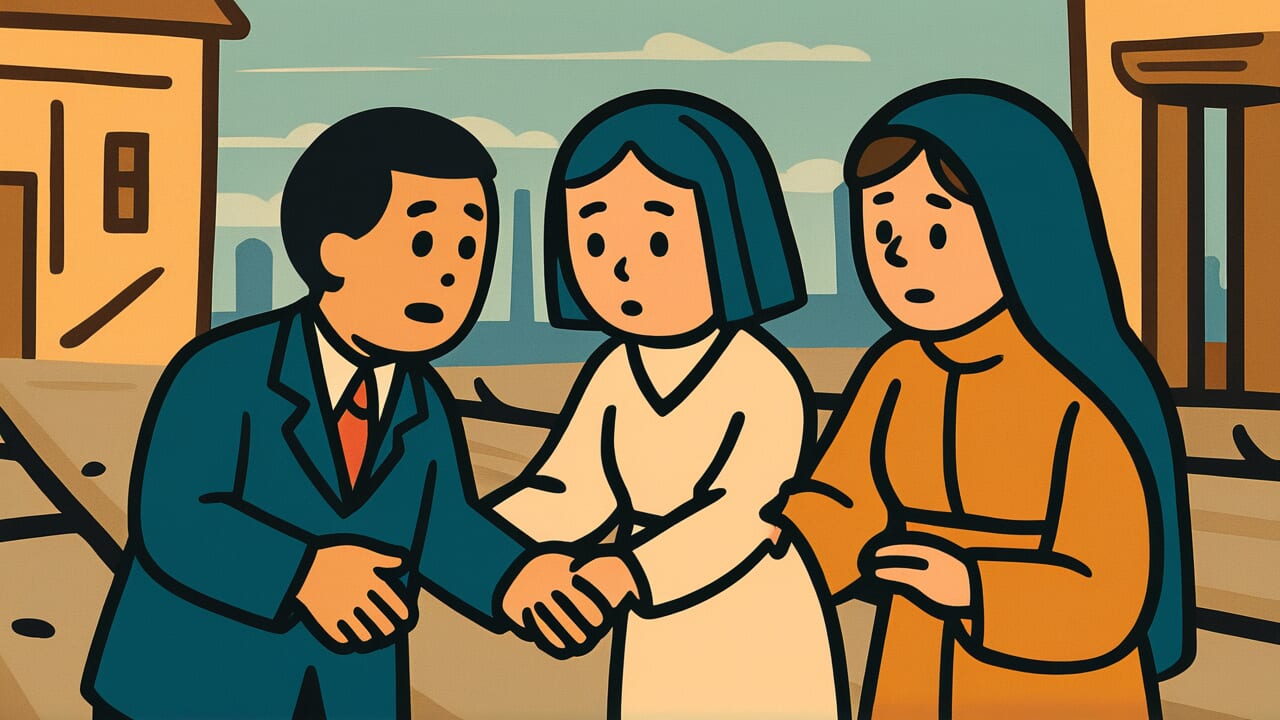How to Read “Rescue from suffering and share in disaster”
Urei wo sukui wazawai wo wakatsu
Meaning of “Rescue from suffering and share in disaster”
This proverb shows the reality that human goodwill and effort have limits. When someone is sick, you can nurse them back to health. When they have emotional troubles, you can listen and support them.
However, natural disasters like earthquakes and typhoons, or unavoidable misfortunes of fate, cannot be completely taken away from someone. No matter how close you are to them, you cannot bear these burdens in their place.
At best, you can endure together and share in the suffering.
This proverb teaches the importance of recognizing the limits of helping others. If you try to save everything and collapse yourself, it means nothing.
It advocates a realistic attitude of distinguishing what you can and cannot do, and doing your best within the scope of human power. For people working in medical care, nursing, and disaster relief, these words are also wisdom for protecting themselves.
Origin and Etymology
The exact source of this proverb is unclear, but we can make interesting observations from its structure. Let’s focus on how the two words “urei” (suffering) and “wazawai” (disaster) are used in contrast.
“Urei” has long been used to refer to illness and physical or mental suffering. This relates to problems of the human body and mind.
On the other hand, “wazawai” means natural disasters or fateful misfortune, indicating a realm beyond human control. By placing these two side by side, the proverb clearly shows the boundary between what humans can and cannot do.
The choice of verbs “sukuu” (rescue) and “wakatsu” (share) is also revealing. Illness and suffering can be “rescued” through medical care, nursing, and emotional support.
However, disaster can only be “shared” or divided among people. This expression contains deep insight into the limits of human power.
This proverb likely arose from the experiences of people working in medicine and welfare. It’s thought to crystallize the wisdom of ancestors who learned through years of experience the reality that no matter how hard you try, you cannot completely prevent disasters and misfortunes caused by nature or fate.
Usage Examples
- As a doctor, I can treat a patient’s illness, but I cannot do anything about the misfortunes that befall their life. This is truly “Rescue from suffering and share in disaster”
- I’m supporting disaster areas as a volunteer, and I really feel the meaning of “Rescue from suffering and share in disaster.” There are limits to what we can do
Universal Wisdom
This proverb has been passed down because it brilliantly captures two essential human impulses. One is the goodwill to help others. The other is the pain of facing one’s own powerlessness.
When people see someone suffering, they want to help somehow. This proves that humans are social creatures.
But at the same time, we face the reality that no matter how hard we try, there are things we cannot save. Struggling with this contradiction and sometimes blaming ourselves is also human nature.
Our ancestors left us “the wisdom to distinguish what we can and cannot do” to resolve this contradiction. Admitting that you don’t need to carry everything and that humans have limits is not coldness.
Rather, it’s wisdom for maintaining sustainable kindness.
This proverb warns against the arrogance of trying to become a perfect savior. It teaches the importance of humbly accepting your own limits.
At the same time, it shows hope that support within your capabilities is never meaningless. Precisely because human power has limits, doing your best within those limits has value.
When AI Hears This
Let’s quantify the difficulties one person faces. Suppose there’s a load of 100. When one person carries this alone, their system must accept 100 units of disorder (entropy).
The human mind and body have limited processing capacity. When a certain threshold is exceeded, irreversible collapse occurs. This corresponds to “rapid collapse of local order” in thermodynamics.
However, when this 100 is shared among 10 people, the load per person becomes 10. What’s important is that while the total load doesn’t change, the stability of the entire system improves dramatically.
This is because each individual can process a load of 10 within the range of their self-repair function (homeostatic maintenance function). In other words, by distributing it, no one exceeds their critical point.
What’s even more interesting is that in the open system of human society, each person recovers over time and the load itself diminishes.
While entropy would continue to increase in an isolated system, in an open system, order can be restored by taking in energy from outside (food, sleep, encouragement from others). If 10 people recover in turn, eventually the difficulty of 100 disappears.
This act of “sharing” is not just morality. It’s a physical strategy where individuals with finite processing capacity gather together to maximize overall sustainability.
Lessons for Today
What this proverb teaches modern people is “the courage to focus on what you can do.” In our modern age, we see misfortunes from around the world through social media.
We tend to feel pain for every problem and suffer from a sense of powerlessness. However, the range where you can directly reach out is limited. That’s not coldness. It’s reality.
What matters is identifying what you can do and doing your best within that range. Listening to the worries of someone in front of you. Helping someone nearby who’s in trouble. Supporting someone using your expertise.
These actions of “rescuing from suffering” are definitely things you can do.
On the other hand, you don’t need to carry all the disasters and misfortunes in the world. If you try to force yourself to do what you cannot, you’ll collapse yourself.
Rather, by acknowledging your limits, sustainable support becomes possible.
With this wisdom in your heart, please be someone’s strength within your capabilities. The accumulation of small acts of kindness becomes the great force that supports society.



Comments